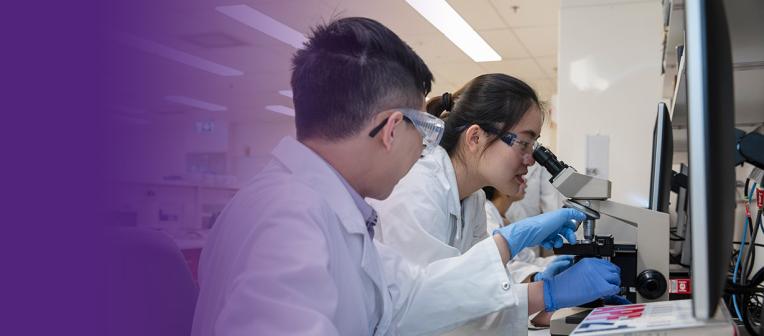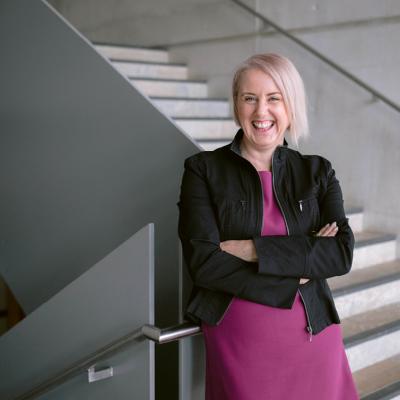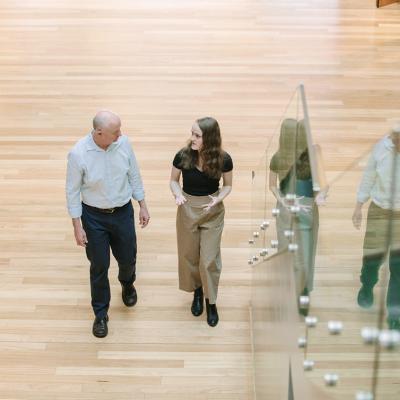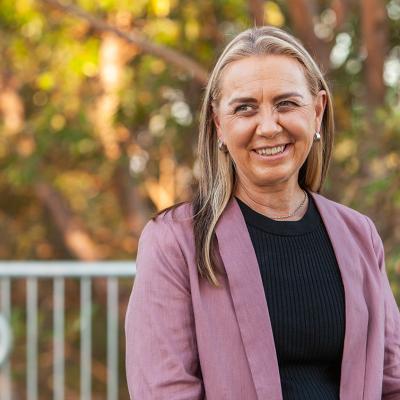Considering studying pharmacy at university? You may have lots of questions. We're here to help you find answers.
- What do pharmacy students study?
- What does a day in the life of a pharmacy student look like?
- Why study pharmacy?
- What kind of job can I get with a pharmacy degree?
- Is studying pharmacy worth it?
We've interviewed a UQ student to find out. Samantha King is a Bachelor of Pharmacy (Honours) student, and she's here to share her experiences and insights into studying pharmacy, to give you a better idea of what to expect from this exciting and ever-advancing field.
Let's find out if pharmacy sounds like the study area for you.
Since this article's original publish date in September 2021, Samantha has graduated and is now working as a first-year foundation resident Society of Hospital Pharmacists Australia (SHPA) pharmacist at the Queensland Children’s Hospital (QCH). She is pursuing her goal of working in paediatric pharmacy by engaging in rewarding and innovative research opportunities within this area.
What’s the most unexpected thing you’ve learnt while studying pharmacy at UQ?
A common misconception for those outside of pharmacy is that the scope of practice for pharmacists is limited to hospital and community pharmacies. But nothing could be further from the truth.
There are many unexpected and inspiring roles that pharmacists are engaged with, including:
- pharmaceutical research
- drug development
- medication management within aged care facilities
- medication reviews
- medication policy advisement.
The pharmacy profession has tremendous employment flexibility, and pharmacists can even choose to specialise their skillset and practice to niche fields of medication use, such as chemotherapeutics or paediatrics.
As a student pharmacist, I even had the opportunity to assist the Queensland Department of Health facilitate the rollout of COVID-19 vaccines during the coronavirus pandemic.

Many UQ pharmacy students enjoy putting their theory into practice as student pharmacists.
What drew you to study pharmacy?
I’ve always known that I wanted to undertake a career in healthcare, but it became apparent to me that pharmacy was my field of choice when I began to understand the tremendous impact that modern medication use and quality use of medicines has had on the world around me. For example, pharmacy has recently continued to demonstrate its value to community healthcare through the facilitation of an expanded community vaccination program and novel antibiotic prescribing trials in community practice.
“As an aspiring registered pharmacist, I want to continue creating a positive impact within the profession and improve medication-related outcomes within my community.”
What are the most valuable skills you’ve learnt while studying pharmacy?
The greatest skill I’ve learnt is to never underestimate the knowledge and value of those surrounding you in your practice. While studying pharmacy, I’ve had the privilege of working alongside some incredible pharmacists, pharmacy assistants, pharmacy technicians and academics. My learning experiences have certainly not been limited to my university studies though and have also been greatly strengthened from my experiences through leadership, employment and engagement with my peers.
What does a day in the life of a pharmacy student look like?
Nowadays, a lot of Bachelor of Pharmacy (Honours) students also work within the pharmacy profession to support what they’re learning and strengthen their employability. Therefore, the day-to-day life of a pharmacy student often involves balancing a busy schedule of study, work and – of course – some much-needed relaxation and self-care.
The great thing about working as a student pharmacist is the fantastic practical exposure you can receive to complement your studies. Through my employment experience in hospital and community pharmacies in Brisbane, I’ve made some incredible lifelong friends and have engaged in mentorship with pharmacists who have pursued inspiring and unique career pathways. This employment experience has also helped to strengthen my employability for my intern year and beyond.
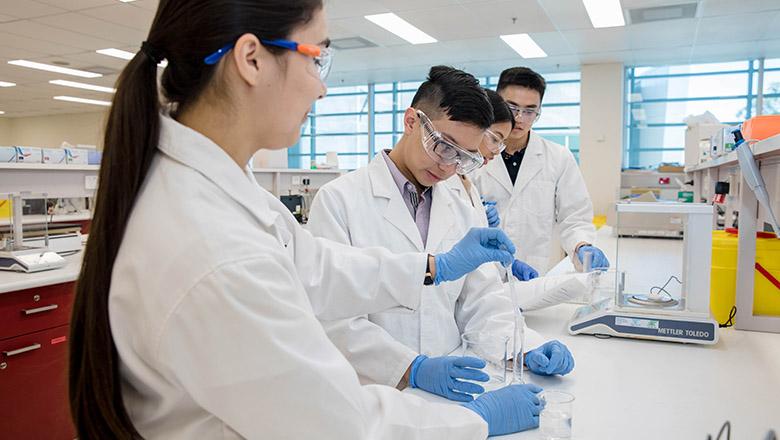
Studying pharmacy at UQ involves hands-on laboratory experience.
What have you learnt about yourself since you began to study pharmacy at UQ?
Before studying pharmacy, I felt lost in my sense of professional identity as an aspiring healthcare provider, and I never considered myself to be a leader or mentor within my academic pursuits. Having a faculty and network of pharmacists who support me in all my professional endeavours has given me the confidence to achieve beyond my own expectations within my profession.
I’ve discovered the tremendous impact that pharmacists and pharmacy workers can have on community healthcare, and I’m eager to witness how the pharmacy profession can continue to develop and evolve with new innovations.
How have your teachers had a positive impact on your studies?
The best aspect of being a pharmacy student with UQ is definitely that we have our own study space: the Dutton Park campus. The academics here go above and beyond to support pharmacy students, and they give students the opportunity to provide valuable feedback about their study experience at every step throughout their education.
Also, as you progress through your education in pharmacy, your cohort becomes like your family. The School of Pharmacy and Pharmaceutical Sciences hosts many great traditions that help unite us as a cohort, such as:
- an annual pharmacy ball
- pharmacy-specific fundraising and industry events
- a graduation dinner to commemorate final year students.
What’s one of the most valuable aspects of studying at UQ Dutton Park?
The most unexpected and valuable aspect of studying pharmacy was the strong sense of community within pharmacy practice. Once you enter the workforce, it’s unbelievable how tight-knit the pharmacist community is with one another.

It’s not “all work and no play” at UQ Dutton Park. Students here are welcomed into a tight-knit community where they form lifelong friendships.
A career in pharmacy has many options. Where do you want to go or what do you want to do in your pharmacy career?
I would love to pursue a future specialisation in paediatric or neonatal care.
In my final year of my degree, I undertook a major in clinical and experimental therapeutics at the Royal Brisbane and Women’s Hospital, working with parents and neonates. From this experience, I’ve really enjoyed the pharmacological practice of family-centred care and individualising medicines to optimise health outcomes in our littlest patients.
When you study pharmacy in Australia, you may have the opportunity to complete a rural placement as part of your program. Samantha did her placement in the Queensland town of Goondiwindi.
What was your favourite experience while on your rural placement?
In my final year of pharmacy, I had an unforgettable and insightful experience completing my 1-month community placement with Allen’s Pharmacy in Goondiwindi, Queensland. The rural town of Goondiwindi defies statistics of poor health outcomes in rural regions – in August of 2021, it was reported that 63% of the local population were fully vaccinated with the various available COVID-19 vaccines.

Samantha's pharmacy mentors are heavily involved in the community in supporting local agribusiness, and they provided her with an opportunity to fly across the local stations to observe the various local croplands.
It was fantastic to get involved as pharmacy paved the way for vaccination accessibility to vulnerable populations across the border in northern New South Wales, such as the Toomelah Indigenous Mission.
Why would you recommend students undertake a rural placement?
As a rural practitioner, pharmacists and pharmacy students can undertake a tremendous breadth of clinical services and practise their clinical knowledge and training to their full extent. My rural placement experience provided me with the unique opportunity to learn from inspirational preceptors (professional pharmacy mentors) with unique specialisations (including being the only diabetes education accredited provider within a 200km radius!). I also had the opportunity to engage with health equity rural community projects, and I participated in the delivery of Indigenous healthcare.
“The UQ School of Pharmacy provides fantastic emotional and financial support to support students who wish to pursue a rural placement experience. I was fortunate to receive generous accommodation and travel subsidies during my rural placement.”
What advice would you give to someone who wants to study pharmacy at UQ?
My best piece of advice for pharmacy students is to get involved. The unique and insightful experience of studying pharmacy is that there are many extracurricular pathways and activities open for students to get involved.
Nowadays, employability isn’t solely dependent on academic achievement, and as a student I’ve had tremendous personal growth through my involvement in the pharmacy community. Through this involvement, I’ve fostered a strong passion for my career in healthcare, which empowers me to continue making a valuable contribution to my profession.
Explore the Bachelor of Pharmacy (Honours) or discover what it's really like to study other programs at UQ.

